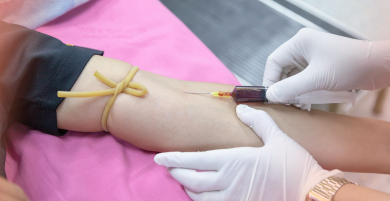Ah, India - a nation of rich customs, unparalleled friendliness, and (sadly) some truly odd historical stories! From "don't touch pickles" to "don't enter the temple," menstruation has been surrounded by myths and taboos. Surprisingly, some people believe that menstrual blood is 'impure', making women unable to donate blood.
Reality check: Your blood is completely fine! Blood banks do not examine if you are on your period; they look for infections, haemoglobin levels, and overall health. If you match the requirements, your blood is just as life-saving as anyone else's!
Can You Donate Blood During Your Period?
Short answer: YES, you surely can!
Your menstrual cycle does not prevent you from donating blood. While you are already losing blood, the amount lost during menstruation is significantly less than during a blood donation session. However, if you are feeling weak, dizzy, or experiencing a heavy flow, it may be best to wait until you feel better.
How Much Iron Is Lost In Blood Donation?
An average blood donation session removes between 200 and 250 milligrams of iron from the body. Menstruation already causes minor iron loss (about 1 mg per day), hence regular blood donation can occasionally lead to iron shortage. To avoid this, eat iron-rich foods and consult your doctor to discuss supplements as needed. Or simply eat some dark chocolate; we will not judge!
Yes! Dark chocolate is a good source of iron, making it a tasty way to replenish some of what’s lost through menstruation or blood donation. A high-quality dark chocolate (70% cacao or higher) can contain around 10-12 mg of iron per 100g, which is more than some meats and leafy greens!
When choosing dark chocolate for iron benefits, look for:
- 70% cacao or higher- Higher cacao content means more iron.
- Low added sugar- Excess sugar can reduce overall health benefits.
- No milk solids- Dairy can interfere with iron absorption.
- Iron-boosting options- Some brands add extra iron for a boost.
Pair it with vitamin C-rich foods (like oranges or strawberries) to enhance absorption, and you’ve got yourself a delicious iron fix!
Can We Give A Blood Test During Periods?
Yes! Menstruation has no influence on most blood test results, with the exception of iron testing, which may show slightly lower levels due to blood loss. If you are being tested for anemia or hemoglobin, you should wait until after your period to receive more trustworthy results.
Who Should Avoid Donating Blood?
- If you are pregnant or breastfeeding
- Have low hemoglobin levels.
- Had a significant illness or surgery
- Chronic ailment like diabetes, heart disease, or an infection like HIV, hepatitis, or malaria
- The minimum hemoglobin level is 12.5 g/dL. No exclusions.
- You must be 18–65 years old and weigh at least 50 kg. Basically, if you can lift a bucket of water, you're set!
- If you're on your period and feeling fine, go ahead! However, if you are tired or have low blood pressure, consider postponing.
- Menstruation itself increases iron loss, so check your iron levels before donating.
- Due to differences in iron levels, women can donate every four months and males every three months.
Are There Any Negative Effects Of Donating Blood?
For the most part, donating blood is a safe and well-regulated procedure. However, some people—especially menstruating women—may experience mild side effects due to fluid and iron loss. Here’s what to watch for and how to recover quickly:
Temporary Weakness & Fatigue
Your body is replenishing lost fluids and red blood cells, which can leave you feeling a little drained. To recover:
- Eat iron-rich foods (dark chocolate, spinach, lentils, red meat) and protein to support blood cell production.
- Get plenty of rest, especially if you feel sluggish.
- Avoid skipping meals before and after donating—your body needs fuel!
Dizziness Or Fainting
Low blood pressure or iron levels can cause lightheadedness or fainting spells. To prevent this:
- Stay well-hydrated before and after donating. Coconut water or fresh fruit juices can help.
- Avoid standing up too quickly after donation– sit for a few minutes before moving.
- Snack on something salty (like nuts or a salty cracker) to help maintain blood pressure.
Bruising And Soreness
Some people notice bruising, tenderness, or mild swelling around the needle site. This happens when blood pools under the skin after withdrawal. To reduce it:
- Apply firm but gentle pressure on the site for a few minutes post-donation.
- Keep your arm elevated if swelling occurs.
- Use a cold compress or ice pack on the area for relief.
Quick Recovery Tips
- Drink plenty of fluids throughout the day (water, juices, ORS drinks).
- Eat a balanced meal with iron, vitamin C (to aid absorption), and protein.
- Avoid intense exercise, heavy lifting, or alcohol for at least 24 hours.
- Listen to your body– if you feel unusually weak or dizzy, rest and seek medical advice if needed.
Donating blood is a generous act, and with a little self-care, you’ll be back to feeling great in no time!
Periods Or Not, You’re A Superwoman!
Your period does not determine your ability to serve others. If you're qualified and feeling good, go ahead and donate. And if you need a little additional attention, get some rest before making that appointment.




























































